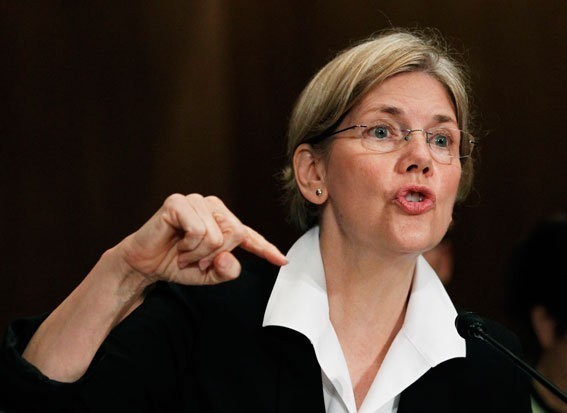Sen. Elizabeth Warren, D-Mass., called Wednesday for breaking up big banks through structural reforms that would bring a decisive end to “too big to fail.”
Warren told a Levy Economics Institute conference she has worked with other lawmakers to advance a bill that would build a wall between commercial banking and investment banking.
“If banks want to access government-provided deposit insurance, they should be limited to boring banking,” she said. “If banks want to engage in high-risk trading, they can go for it, but they don’t get access to insured deposits and put the taxpayer on the hook for some of that risk.”
At least one bank observer would be OK with this move.
“To say theoretically that we should have more manageable-sized financial institutions than some of these mammoths that are a threat to the stability of our economy like we saw in 2008, essentially I agree with that,” says Michael Grant, president of the National Bankers Association. “My only issue would be in terms of process, how does one dismantle them, how does one cut them down to size.”
Another approach would be to simply reduce the size of some of the biggest banks.
Warren urged action on the issue because though she believes the Dodd-Frank financial reform law improved the financial landscape systemwide, risks remain among the largest institutions.
She said according to both the Federal Reserve Bank and the Federal Deposit Insurance Corporation 11 of the biggest banks in the nation were so risky that if one faltered, it would require a bail out from the federal government. Even worse, she warned, it could endanger the entire financial system.
“That is not a statistic that should make you sleep well at night,” Warren said.
A strong advocate for everyday borrowers, Warren also underscored the need for reform in the auto loan market, which she compared to the pre-crisis era housing market. She views the industry as rife with lax underwriting, predatory and discriminatory lending practices and increasing repossessions.
As a solution she called for the industry to come under the oversight of the Consumer Financial Protection Bureau, an agency she has championed and at one time led.
“The key steps aren’t hard. We know what we need to do. It just takes political courage and strong demand from the public to complete the unfinished work of financial reform,” she said.
Warren has resisted entreaties from liberal supporters who want her to launch a presidential campaign. However, her strong rhetoric on what she sees as Wall Street’s excesses could help shape the debate in 2016.


